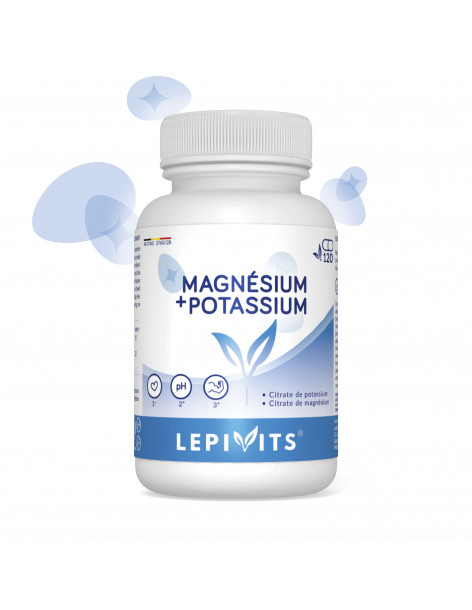Minerals
The role of minerals
Minerals are inorganic substances naturally present in the soil and in rocks. The supply of minerals is essential to our health and is easily found in our food, because in addition to water and macronutrients, food provides us with minerals that are essential to the proper functioning of our bodies.
Why are minerals essential? Some of these minerals are involved in many vital functions of our metabolism. They are involved in the muscular and nervous systems as well as in the hormonal and immune systems.
Although they are naturally present in our bodies, they are often present in smaller quantities. The energy we need to live our daily lives consumes a large part of these reserves, which is why we must continually make up for these losses through a balanced diet and mineral-rich food supplements.
There are two categories of minerals:
- Minerals, which make up the majority of our body mass and therefore require anywhere from a few milligrams to several grams;
- Trace elements, which are only present in trace amounts in our bodies.
About twenty minerals are considered essential for our health. We present the main ones here.
Essential minerals
Zinc
Zinc is probably the most widely supplemented mineral and the most important for the human body. It is involved in more than 200 enzymatic reactions and protects the body against free radicals. Its involvement in protein synthesis makes it an essential nutrient for cell renewal and healing, especially in the skin.
For which problems should zinc be taken? For cell ageing, skin problems and acne, for tooth and nail care. The Lepivits Zinc Forte food supplement is ideal for reduced immunity, hair loss and loss of muscle mass.
Iron
Iron deficiency, known as anaemia, is most common in France, particularly among pregnant women and people on a vegetarian diet, as iron is mainly found in animal proteins.
In our body, iron helps to make red blood cells and its haemoglobin, which allows oxygen to circulate from the lungs to the various cells of the body.
Why take iron? To avoid iron deficiency anaemia during pregnancy or to help vegans regain energy. Discover Fer Forte, the iron supplement from Lepivits.
Magnesium
Magnesium is one of the most common minerals in our body, half of which is found in bone tissue and a quarter in muscle.
The need for magnesium varies enormously over the course of a lifetime and peaks during adolescence, intense physical activity, pregnancy and ageing.
As a regulator of carbohydrate and lipid metabolism, magnesium is involved at many levels in the body's functions: the cardiac system, the nervous system, muscle tissue, mental function, etc.
What is magnesium used for? Mainly to reduce fatigue and anxiety, combat stress and restore metabolic energy, as the Magnevits supplement does.
Calcium
Very popular in children's supplements, calcium is the mineral par excellence for bone building and skeletal renewal. In our bodies, 99% of our calcium is found in the bones, which act as a reserve, even though this commodity is rarely available. It is therefore necessary to regularly supplement with calcium-rich foods. A sedimentary rock called dolomite is rich in natural calcium and magnesium
It also strengthens the health of teeth and nails and is involved in muscle contraction, blood clotting and the transmission of nerve impulses.
When should calcium be taken? In case of bone fragility, after an injury for example, or if you suffer from cramps or high blood pressure.
Potassium
Potassium often works together with sodium to maintain the acid-base balance inside and outside the cells. In addition, it contributes to the proper functioning of the kidneys and adrenal glands and enables the contraction of the heart muscle. This is why it is recommended to reduce the risk of cardiovascular disease and hypertension.
Why take potassium? It is often recommended in cases of kidney stones and osteoporosis. But you can also take Lepivits potassium as a supplement to improve your tone and sports recovery.
Sodium
Sodium, commonly confused with salt for its high sodium content, is a key mineral in the regulation of osmotic pressure and the hydro-electrolyte balance in cells. Indeed, it is the main ion in extra-cellular fluids.
There is very little deficiency of this mineral in the French population and a healthy diet, without added salt, is sufficient to cover the body's needs.
Why do we need sodium? To regulate blood pressure.
Selenium
Selenium is essential for certain antioxidant enzymatic reactions, acts against free radicals and stimulates the immune system. It also cleanses the body of toxic molecules and heavy metals such as mercury and lead.
Why take selenium? To prevent ageing of the eyes and Alzheimer's disease, but also cardiovascular diseases and certain cancers (prostate, colon, lungs). Coupled with vitamin E, the selenium-rich food supplement from Lepivits helps protect the thyroid.
Where to find minerals in food?
Most vegetables and fruit are rich in minerals, as they are absorbed from the soil as they grow. Many minerals are also found in animal flesh. What foods are rich in minerals?
- Zinc: oysters, offal, red meat, wholemeal bread and eggs;
- Iron: clams, meat (pork and lamb), beans and lentils, tofu, cereals;
- Magnesium: fish, seafood, oilseeds, cocoa, cereal seeds, turmeric;
- Calcium: dairy products (cheese, milk and yoghurt), almonds, spinach, seafood;
- Potassium: lentils, dates and prunes, oilseeds, mushrooms, spinach, avocados;
- Sodium: fine salt, fleur de sel, sea salt, broths, soy sauce, anchovies, salmon;
- Selenium: fish and seafood, meat and offal, oilseeds.



